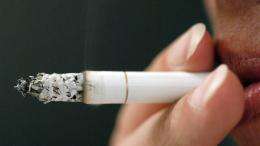Smoking and Drinking Linked to Bowel Cancer: Know Your Risks

(PhysOrg.com) -- Besides delectable dishes that help us pack on the pounds during the holiday season, many people also let loose with a bottle of wine or a pack of cigarettes. Richard Rood, MD, says moderation is the key, but to also keep in mind that you may be harming more than your liver or your lungs with these social activities.
The holidays are a time for gathering together to enjoy the company of family and friends.
But oftentimes, the celebrations also include temptations that are not good for our bodies.
Besides delectable dishes that help us pack on the pounds during the holiday season, many people also let loose with a bottle of wine or a pack of cigarettes.
Richard Rood, MD, says moderation is the key, but to also keep in mind that you may be harming more than your liver or your lungs with these social activities.
“Studies have shown that alcohol consumption and smoking cigarettes are important risk factors for bowel cancer,” says the UC Health digestive diseases expert. “Although a glass of eggnog or wine and a cigarette during the holidays aren’t going to instantly give you cancer, excessive use of these products can cause harmful effects, and with repeated casual utilization, there’s a chance of forming unhealthy habits that can lead to continued use.”
Rood says studies have shown that people who consume more than seven drinks per week have a 60 percent greater risk of developing the cancer when compared with non-drinkers. He says smoking, obesity and diabetes were also associated with a 20 percent greater risk of developing bowel cancer.
“Colorectal cancer is the fourth most common form of cancer in the United States and the third leading cause of cancer-related death in the Western world,” he says. “If left untreated, it is fatal, but it is easy to treat in its early stages. Diagnosis and treatment are crucial.”
Rood says that individuals should seek recommended screenings for bowel cancer based on their risks and that everyone over the age of 50 should have a colonoscopy.
“If nothing is identified, the colonoscopy should be repeated every 10 years,” he adds.
In addition, he says people with a family history of colon polyps or colon cancer should begin their colonoscopy screening at age 40 at the latest. This should, at minimum, be repeated every five years, unless there is a family history of inflammatory bowel disease, including ulcerative colitis and Crohn’s disease, which increase a person’s chances of developing bowel cancer.
Rood says the most frightening part about colon cancer is that there are no symptoms or signs of its onset.
“That is why screening is so important,” he says. “Know your risks and take preventative measures, such as eating right, like limiting red meat. We should be eating whole grains, exercising and avoiding alcohol and tobacco to not only steer clear of various cancers, but also to live a healthier, disease-free life.”















